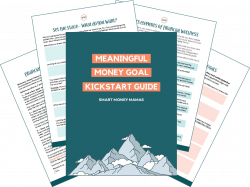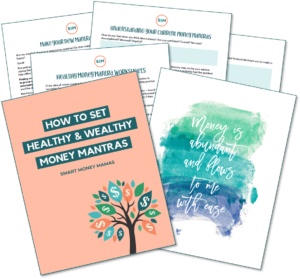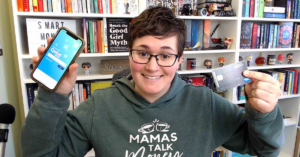
5 Money Goals That Need a High-Yield Savings Account
A high-yield savings account should be a tool in every family’s financial plan, especially for short- to medium-term goals. But

How do you feel when you hear the word “budget”?
Do your shoulders tighten? Are you preparing to throw a hip check to protect your Starbucks cup? Can you feel someone slipping a straight jacket around you?
It’s a rough word. And words matter.
Yet, it’s a concept that can help heal our relationship with money and soothe our financial anxieties.
But how do we do it? How do we embrace a word that triggers so much tension?
Far too often, budgeting is discussed as a way to limit, restrict, tighten down our spending. And words matter. These ways of talking and thinking about budgeting are holding us back from the healthy relationship with money and wealth that we all want – for ourselves, our spouse, and kids.
How is this thought process holding us back?
Those words – and honestly, many of the common budgeting practices – force us into a mindset of scarcity.
That there isn’t enough. That we’re doing something wrong. That budgeting is a punishment for people who are bad with money.
But what if we flipped the script? What if, instead of thinking about budgeting as a restriction, we associated it with mindfulness, intention, joy?
It would take practice – like all worthwhile things do – but by treating budgeting as the radical act of self-love that it is, we can connect our money with the goals and things we value most in life.
Let’s get started. These are the five steps to budgeting from a place of abundance and love.
Your budget should never be about the things you can’t do.
First of all, you’re in control. You decide what fits in the budget and what doesn’t. If something doesn’t fit, it should be because you decided it doesn’t align with your broader plan right now.
It doesn’t mean never, it means not right now.
And to feel that sense of control and power, there’s something you need to do before you ever dive into your budget.
You need to take the time to identify what matters most to you, where do you want to go in life and how do you want your money to serve you. And you need to reflect on where finding your courage and managing your money with intention will bring you.
Maybe a thoughtful budget gets you closer to that big Disney vacation with your kids. Maybe it builds your emergency fund so you have the safety net you need to start a business you’ve been dreaming of. Maybe it helps you send your kids to college.

Grab our free Meaningful Money Goal Kickstart Guide and start setting goals you’ll love and achieve!
Now, if you’re in debt or living paycheck-to-paycheck, these ideas may seem impossible. But it works for you too, your images might just be different at the beginning.
What would it feel like to not have debt payments? To not be waiting anxiously for your next paycheck? Would you feel free and secure? Relaxed and empowered?
These are the images you should focus on when you sit down to budget. Not the mental lashing your giving yourself for being where you are right now, but the encouraging images of where this will get you.
Will you still have to rein in your spending in some places? Almost certainly. But you’ll get to choose those places based on the vivid, meaningful things your budget is giving you. Not just because some money guru or financial advisor told you you had to.
Feels better, right?
But what about those expenses we have to make that don’t feel aligned with what we want today? Well, that’s our next step.
So many people sit down to work on their budget with meaning and purpose, but get the life sucked out of them when they have to pay their huge student loan bill or the car loan that they’re upside down on and can’t get out of.
They start to focus on berating themselves for decisions they made in the past and they lose touch with where they’re going and the healthy relationship they are building with money through their budgeting practice.
Scanning down your budget and seeing, “Mortgage”, “Car Note”, “Student Loans”?
Not exactly fun. And super disconnected from how those things serve us.
So, reconnect them. Literally re-name your budget categories.
You can shift “Rent” or “Mortgage” to “Our Home”, “Sanctuary”, or “The Burrow”.
Change “Car Payment” to “Wheels” or “Freedom to Roll”
Redefine “Groceries” as “Nourishment” or “Healthy Fuel”
For your debts, think about what those things got you and how they impacted your life at the time. “Student Loans” can become “Quality Education” or “Opening My Mind”.
This all seems so silly at first. But especially when your budget is tight and you don’t feel like you have a lot of intention and choice with your money, connecting with how your spending enriches your life will make the process easier.
As you re-name your categories, don’t be afraid to be playful and creative. Choose a style that feels right to you. Heck, if you have a category where you just can’t find a positive angle? Name it something that makes you chuckle.
We have to come to and address money with ease.
Over the top joyful, incredible experiences and activities don’t have to cost a lot of money. Often, they don’t have to cost any money at all.
For example, my sister-in-law used to host annual Iron Chef competitions with her friends. They would pick an ingredient and everyone would bring a potluck dish that included that ingredient. At the end of the night, they’d vote on the best one. Usually, there was a little prize from the Dollar Store. But mostly, everyone had fun debating who was skirting the rules or laughing about someone who made something completely unexpected.
It didn’t cost much, but we all have such good memories from those competitions.
When you’re feeling like your financial situation is keeping you from doing fun things, take a step back and make a list of fabulous, frugal fun activities you could do with your spouse, your kids, or your friends.
Most public libraries have passes to local museums, zoos, and aquariums that you can check out of the library for free. You could invite your girlfriends over to do a Paint night in your living room with a YouTube video and $1 canvases from DollarTree. Make a new recipe from a country you want to visit.
Do these things require thinking outside of the box a little? Maybe even being a little silly? Of course! But I can promise you that you and your friends will be talking about $1 Paint Night a lot longer than a night out for drinks.
Gratitude is one of those things every parent wants their kid to have. None of us want to raise Veruca Salt and we know the challenges faced by adults plagued by entitlement.
Luckily, one of the greatest ways to keep abundance in our money relationship and teach our kids about gratitude, is to practice it ourselves.
After hearing Brene Brown give a talk where she shared that each night at dinner every member of her family shares something they are grateful for, we started it at home too. And at first, the things we were grateful for were obvious and my husband and I clearly felt a bit uncomfortable in the exercise.
But over time, we started to look for things to be grateful for. Things we could share at the dinner table. And as my husband and I shared more thoughtful things, our four-year-old started to as well.
When you start to feel restricted by your budget, take a moment to call to mind some of the blessings in your life. The stuff you are immensely grateful for – or the small stuff you too often overlook.
Try keeping a journal or an open, running note on your phone.
Gratitude turns what we have into enough.
Feeling grateful? Or still a little anxious? Hold onto your feelings, because that brings us to our next strategy.
Money is tied to our sense of survival and core basic needs. It’s linked to our ability to keep a roof over our heads, food in our mouths, and clothes on our back. Even if things aren’t quite that dire, that connection to security and comfort means that our feelings about money are very strong.
As you start to budget with abundance, maybe even months or years into your practice, you’re going to have times when you feel anxious about addressing your money. When you want to shut down and ignore your finances completely. Or when you want to check your budget every two hours, panicking the rug is going to be pulled out from under you.
These are your old money stories and beliefs coming up. Don’t ignore them.
As Bari Tessler says, “You can no more resolve old money stories by turning your back on them than you can forgive a friend by pushing him or her out of your awareness.”
We have to give those feelings space.
That means doing regular money mindset check ins. Evaluating what is making us feel scared or powerless on our down days. Celebrating our wins and our growth on the good days.

Reflect on your money beliefs and create healthier money mantras today with our free workbook!
When you feel negative thoughts coming into your mind, don’t shove them away.
Take a moment. Take a deep breath. Ground yourself however works for you.
Then, address your feelings calmly. What’s bringing up the worry? What’s different about today or this week? Did your mom say something that triggered old fears?
Example: Maybe money is particularly tight and you’re convinced you can’t make ends meet this month. You see your weekly money meeting with yourself pop up and every fiber of your body wants to hit ignore.
Okay, deep breath, ask yourself how you can make it better.
You can tell yourself, “Ok, mama, I can feel your anxiety and all the stress of the last time a month like this got us in debt and out of control. But let’s reclaim our power. First, we’re going to update this budget and see how bad things actually are and what we’re worrying about that isn’t real. Then, if I don’t see an easy solution in the budget, I’m going to come up with three ideas to plug the gap – step away for a bit – and review them tonight or tomorrow by myself or with my spouse.”
By having internal dialogues like this, you’re validating and honoring the negative emotions and the place they’re coming from. But you’re also reminding yourself that you have the skills and tools to move forward. And that’s important.
As you learn how to identify and connect with your money emotions, you might start to see patterns.
Maybe you find your money anxiety creeps up when your partner has his monthly night out with friends because he rarely sticks to the budget and puts the family in a pinch.
Or maybe, you might find that working on spending less on food brings up a major fear about not having enough. Your family growing up didn’t always have enough food and cutting back, even if your new lower budget is more than enough, is scary.
But shame and fear are less powerful in the light of day.
Giving your emotions space and attention is its own lifelong practice. A lot of us have trouble with it. Especially because we live in a world that seems to think the standard of being okay is being happy 100% of the time.
Yet, by practicing emotional awareness as we handle our money, we can keep learning and growing. We can see when old stories might be holding us back from our full potential or security.
We’ll be able to let go of the past and forge new patterns that serve us better.
Now, we just have to make the process a little more fun. Which brings us to our final step.
Abundant budgeting will become more natural as you do it over and over. At the beginning, you might need a quick daily check in of your accounts and plan for the day. As you develop a system, a 15 to 20 minute weekly meeting with yourself might be all you need.
But if you’re going to stick to this long-term? If you’re going to override the voices in your head telling you budgeting is restrictive and boring?
You’ll have to make it neither restrictive or boring.
Decide what your abundant budgeting practice will be.
Maybe you play some peaceful music, sit in your favorite chair, and have a warm cup of coffee or cocoa in a cherished mug. If you budget with pen and paper, use a nice notebook and a quality pen.
You’re a mom. I know you probably don’t get an immense amount of time to yourself. So take this moment of self-care. Schedule it in your phone on a recurring basis and honor that meeting. Maybe your kiddos are being difficult when that alarm goes off and you have to shift it 15 minutes or an hour. But do it.
What your routine looks like is going to be unique to you and your family. You’ll tweak it – at the beginning, you might need more comfort aspects to help you honor the meeting with yourself, but those may fall away and your routine might simplify as handling your money becomes more natural.
Budgeting and money management is a radical act of self-care. You’re aligning your spending and your life with your values. You’re creating security for yourself and your family. It might not sound as exciting as a pedicure, but it’s way more powerful.
Truly, I’m not here for your lattes or monthly massages. You do what makes you happy.
Instead, I want you to budget so you can go get your massage – if that’s a priority for you – without the guilt and worry. I want you to feel confident that your money is serving your values and your goals.
When you think about money I want you to feel content, competent, and thriving. And the right abundant budget practice can help you do that.
Or listen on Apple Podcasts / Spotify
Debt.com offers free expert financial education, self-help guides, and specialized professional solutions to make personal finance - and getting out of debt - stress-free. If you're feeling overwhelmed by monthly payments or balances, but don't know who to turn too, Debt.com can match you with a trustworthy, debt-solution provider to help you create a debt freedom plan. You can learn more by visiting SmartMoneyMamas.com/debt or by calling their free support line at (844) 462-8280 to discuss your options.




A high-yield savings account should be a tool in every family’s financial plan, especially for short- to medium-term goals. But

Ever have a witty t-shirt idea and think, “Hey, I could totally make money off that?” Or wanted to design

“I could never use Qube Money because I love getting credit card points for my spending!” This is the number
Important Links
Find What You Need
Copyright © 2020 Smart Money Mamas · All Rights Reserved